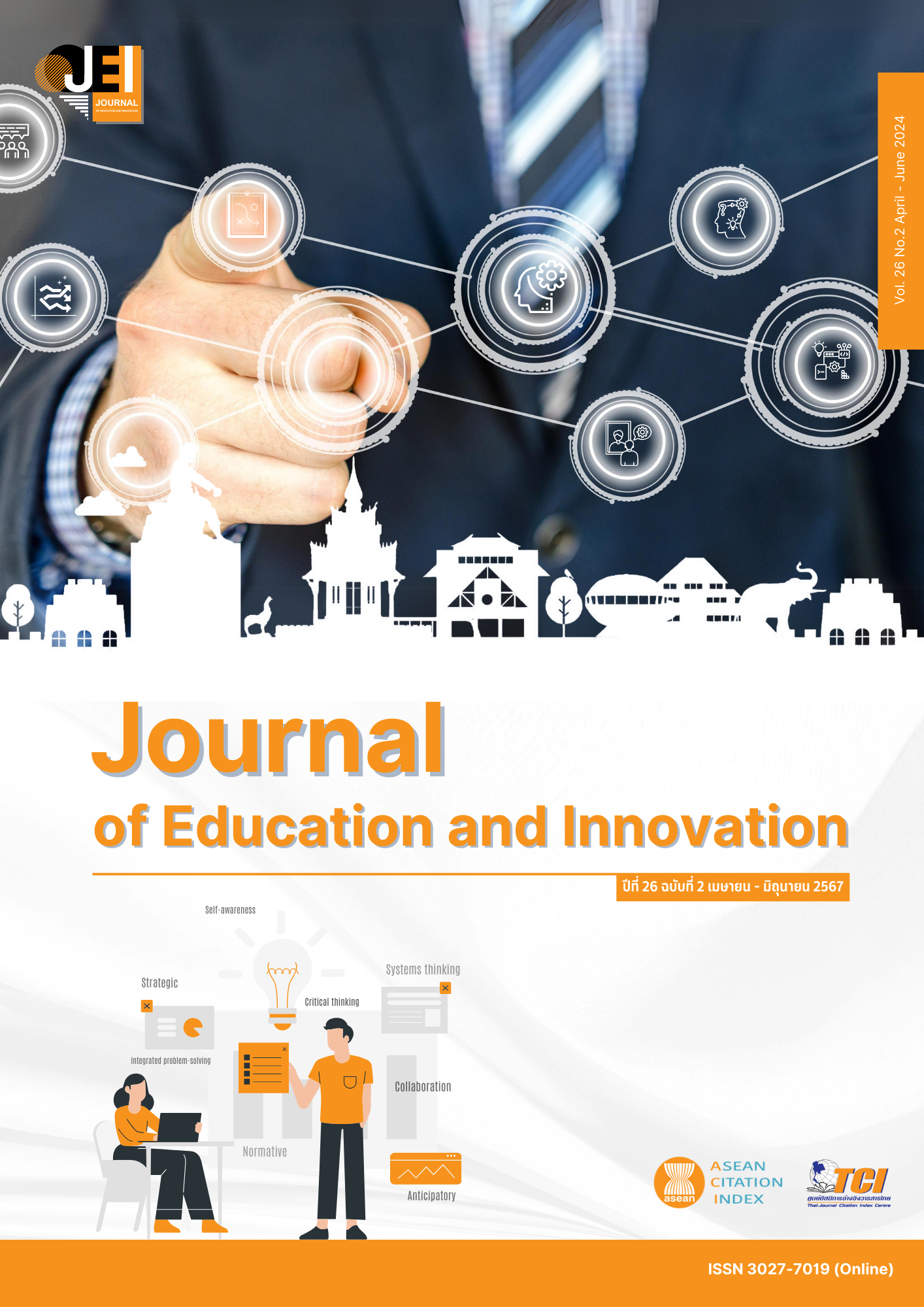FACTOR ANALYSIS OF THE EDUCATON SUPERVISOR’S PROFESSIONAL COMMITMENT UNDER THE OFFICE OF THE BASIC EDUCATION COMMISSION
Main Article Content
Abstract
This research aimed to explore the factors of education supervisor’s professional commitment under the Office of the Basic Education Commission by using the exploratory research methodology. The sample of this research was 430 supervisors under the Office of the Basic Education Commission obtained from multi-stage random sampling technique. The data was collected by using a 5-level rating scale questionnaire with a reliability coefficient by Cronbach's Alpha () at 0.985 of 84 items. Exploratory factor analysis was used to analyze the data. Then extracted components by Principal component analysis and orthogonally rotated components axis with Varimax rotation method. The result showed that the component of Supervisor’s professional commitment under the Office of the Basic Education Commission consists of six components: 1) a desire to maintain professional membership, 2) undiscourage for working difficulties, 3) recognize to the professional value system, 4) participation in professional activities, 5) dedication of physical energy, and 6) prepare for obstacle from work all of these components were able to explain the variance of supervisor’s professional commitment under the Office of the Basic Education Commission at 68.390 percent.
Article Details

This work is licensed under a Creative Commons Attribution-NonCommercial-NoDerivatives 4.0 International License.
The owner of the article does not copy or violate any of its copyright. If any copyright infringement occurs or prosecution, in any case, the Editorial Board is not involved in all the rights to the owner of the article to be performed.
References
Aryee, S., & Tan, K. (1992). Antecedents and outcomes of career commitment. Journal of Vocational Behavior, 40, 288-305.
Baotham, S. (2013). The relationships between perception of job meaningfulness, professional commitment, and professional organizational citizenship behavior of tax auditors in Thailand. Journal of Management Science, 30(1), 115-141.
Carson, K. D., & Bedeian, A. G. (1994). Career commitment: construction of a measure and examination of its psychometric properties. Journal of Vocational Behavior, 44, pp. 237–262. http://dx.doi.org/10.1006/jvbe.1994.1017.
Damrongpanit, S. (2020). Mplus program with analysis of research data in behavioral science and social science (2nd ed.). Bangkok: Chulalongkorn University Press.
Gorsuch, R. (1983). Factor analysis (2nd ed.). Hillsdale, NJ: Lawrence Erlbaum Associates.
Khueanwan, K., & Na Nan, K. (2019). Scale of employee engagement of SME’s production in Pathum Thani province. Santapol College Academic Journal, 5(2), 153-169.
Kraiwan, Y. (2014). Multivariate statistical analysis for research. 2nd printing. Bangkok: Chulalongkorn University Press.
Lin, H. F., & Lee, G. G. (2004). Perceptions of senior managers toward knowledge-sharing behavior. Management Decision, 42, 108-125.
Lodahl, T. M., & Kejnar, M. (1965). The definition and measurement of job involvement. Journal of Applied Psychology, 49(1), 24–33
Meyer, J. P., Allen, N. J., & Smith, C. A. (1993). Commitment to organizations and occupations: Extension and test of a three-component conceptualization. Journal of Applied Psychology, 78, 538-551
May, D. R., Gilson, R. L., & Harter, L. M. (2004). The psychological conditions of meaningfulness, safety and availability and the engagement of the human spirit at work. Journal of Occupational and organizational Psychology, 77(1), 11–37.
O'Reilly, C. A., & Chatman, J. (1986). Organizational commitment and psychological attachment: The effects of compliance, identification, and internalization on prosocial behavior. Journal of Applied Psychology, 71(3), 492–499.
OBEC Supervisory-Division Office of the Basic Education Commission. (2023). Educational supervisor database. Retrieved October 27, 2023, from https://esdc.name/gg/v2/pages/index.php
Porter, L. W., Steers, R. M., Mowday, R. T., & Boulian, P. V. (1974). Organizational Commitment, Job Satisfaction, and Turnover among Psychiatric Technicians. Journal of Applied Psychology, 59, 603-609.
Saks, A. M. (2006) Antecedents and Consequences of Employee Engagement. Journal of Managerial Psychology, 21, 600-619.
Schaufeli, W. B., Salanova, M., González-Romá, V., & Bakker, A. B. (2002). The measurement of engagement and burnout: A two sample confirmatory factor analytic approach. Journal of Happiness Studies, 3(1), 71-92.
Steers, R. M. (1977). Organization Effectiveness. California: Goodyear Publishers.
London, M. (1983). Toward a theory of career motivation. Academy of Management Review, 8, 620-630.
Seneewong Na Ayutthaya, J. (2016). The effect of positive psychological capital and organization climate of service quality: the mediation role of work engagement (Master thesis). Bangkok: Srinakarinwirot University.
Tukham, P. (2014). Model of career progression of women civil servants in Thai public sector organizations. (Doctoral dissertation). Songkla: Prince of Songkla University.
Yayod, I. (2014). Model for strengthening teachers' engagement in educational institutions under the Educational Service Area Office Primary Education (Doctoral dissertation). Phitsanulok: Naresuan University.


